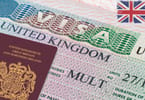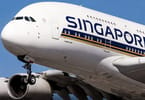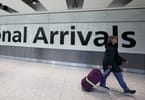Airlines have shown great skill in recent months at finding ways to increase the cost of a ticket without raising their actual fares.
Although the recession has sent fares themselves plunging this year, the fees most airlines charge for checking bags and other services once included in the price of a ticket keep rising and are probably here to stay.
Today we’re looking at yet another potential fee that many travelers may face in the years ahead.
Fees are expected to provide from a little less than 10 percent to more than 40 percent of many airlines’ revenues this year. No one disputes that carriers need all the revenue they can get to prevent any deeper cuts in service, prevent more employee layoffs, and buy new airplanes.
The only notable exception to the trend has been Southwest Airlines, which heavily advertises its “no hidden fees” policy. But recently, even Southwest has raised the hackles of some of its best customers – the people who manage multimillion-dollar travel programs for big companies – with a fee-related issue.
The concern is over a deal Southwest has with one of the intermediaries in the process of selling tickets, which the travel managers worry could eventually raise the cost of flights, not only for their companies but for all customers as well.
Raising an alarm over the Southwest deal is Kevin P. Mitchell, chairman of the Radnor-based Business Travel Coalition, the advocacy group supported by hundreds of corporations that provide airlines with a hefty chunk of their revenue. He predicted last week that if all airlines adopted a new business model similar to Southwest’s, “they’re going to run into some buzz saws from travel managers.”
This issue, as I noted on the Winging It blog the last two weeks, may seem like so much “inside baseball” that has nothing to do with the individual traveler. But stay with me while I explain how the ticket-distribution system works, why there is concern, and what Southwest says in its defense.
Until the mid-1990s, most airlines sold tickets primarily by paying travel agencies commissions, starting at about 10 percent of the fare and rising as the agent increased its sales volume. Agencies used giant airline-owned computer networks, called global distribution systems or GDS’s, to sell more than 80 percent of tickets. The airlines sold the rest themselves.
As airlines built their Web sites and more travelers began to book online, carriers saw the opportunity for big savings and started phasing out commissions.
The move killed off thousands of agencies. The survivors were forced to adopt the current business model of charging customers service fees. The average fee for issuing a ticket today is almost $37, according to the American Society of Travel Agents.
A few years later, the airlines that owned the GDS’s spun them off into independent companies.
Travel agencies now sell half of all tickets and 30 percent of all hotel rooms, going mostly through three big global-distribution systems: Sabre, Travelport, and Amadeus. The GDS’s also have divisions that sell directly to the public, including Travelocity and Orbitz.
At the same time, corporate customers continued to use the larger agencies, better known today as travel-management companies, seeing them as partners with access to all of an airline’s ticket inventory.
The companies depend on the global systems and their agencies to help control costs by providing data on which airlines employees use, and which employees are not following company policy by booking travel on their own, usually on an airline’s own Web site.
The companies say they need the single set of data on their airline spending to strike volume discounts with the airlines and get deals, like reasonable fares for tickets booked at the last minute. The companies also say the only way they can have access to all of an airline’s fares is by using an agency that uses a global-distribution system.
Now, back to Southwest. The airline has well-deserved reputation for good service and setting low fares that other carriers must match to stay competitive. Until the last few years, it has largely sold its tickets through its Web site and didn’t seek to do much business with big companies that wanted to use travel-management companies and global-distribution systems.
But to sell more tickets, Southwest struck a deal in 2007 with one GDS, Travelport, in which Travelport charges agencies $1.25 for each Southwest flight sold through its system, the travel coalition’s Mitchell said. Traditionally, airlines paid the agencies and distribution systems to get their tickets in customers’ hands, not the other way around, he said.
Southwest officials say that it’s up to Travelport to determine who ultimately pays the per-flight fees, either the agency, or the customer. “We don’t have a voice in that economic relationship,” said Rob Brown, Southwest’s director of corporate sales and distribution.
But Mitchell pointed out that other airlines are hungrily eyeing the Southwest-Travelport deal, hoping that they, too, can figure out how to shift some of their distribution costs to one of the other parties in the equation.
And if that happens, guess who could wind up paying a little more to buy a ticket using a travel agent?
WHAT TO TAKE AWAY FROM THIS ARTICLE:
- The concern is over a deal Southwest has with one of the intermediaries in the process of selling tickets, which the travel managers worry could eventually raise the cost of flights, not only for their companies but for all customers as well.
- The companies depend on the global systems and their agencies to help control costs by providing data on which airlines employees use, and which employees are not following company policy by booking travel on their own, usually on an airline’s own Web site.
- The companies say they need the single set of data on their airline spending to strike volume discounts with the airlines and get deals, like reasonable fares for tickets booked at the last minute.






















